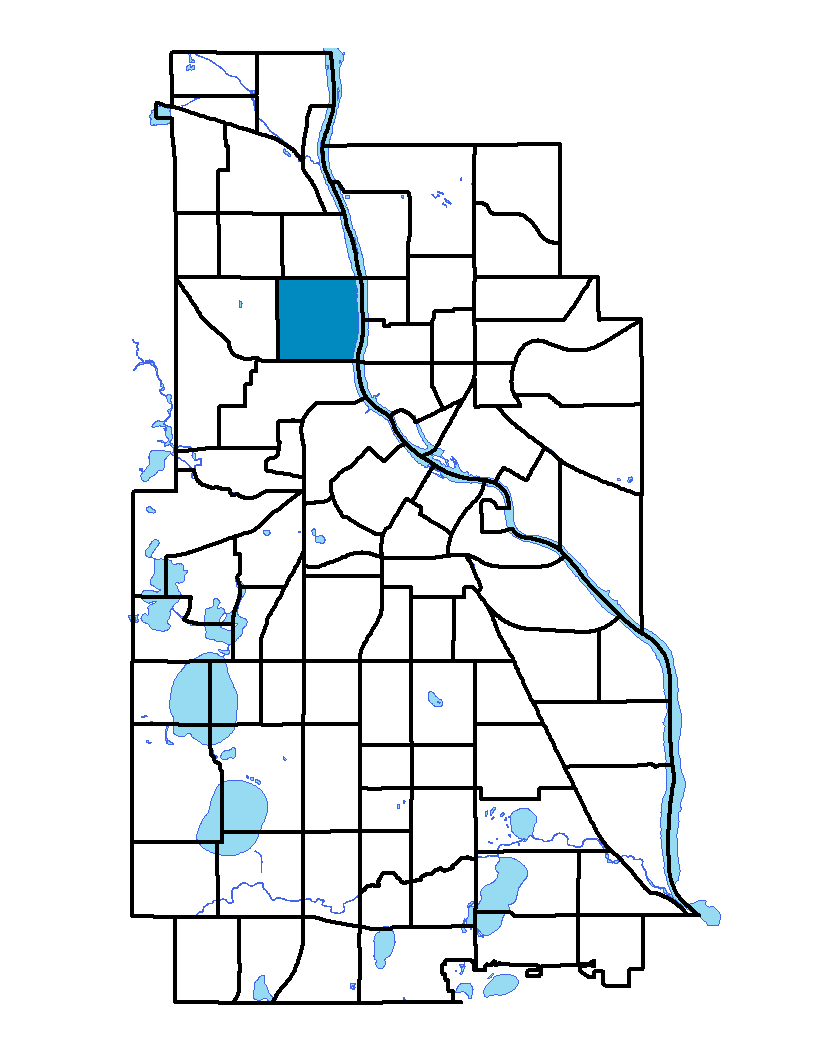Hawthorne is located in north Minneapolis in the city's Near North community. The neighborhood is bounded by the Mississippi River on the east and Emerson Avenue on the west; Broadway Avenue is the southern extent and Lowry Avenue is the neighborhood's northern boundary. The Hawthorne neighborhood is named after the American writer Nathaniel Hawthorne, born in 1804. Hawthorne is mostly a residential neighborhood with single-family houses. Hawthorne Gateway is located in Farview Park. The work of Norman Andersen and Katherine Schaefer, this artwork's shape is based on a tower that used to stand on the park's hill. Large copper animals are perched atop the tower's columns.
To learn more about the neighborhood association visit: www.hawthorneneighborhoodcouncil.org
Indicator Details
| Indicators | Primary Domain | Indicator Value |
Rank |
Tier |
|---|---|---|---|---|
| Public Assisted Households | Employment Opportunities | 100.0% | 87 | Bottom |
| Travel Time to Work | Employment Opportunities | 27 minutes | 86 | Bottom |
| Excessive Housing Cost Burden | Housing | 53.8% | 85 | Bottom |
| Employment Rate | Employment Opportunities | 44.1% | 83 | Bottom |
| Proximity to Superfund Sites | Environmental Hazards | 87.6% | 82 | Bottom |
| Preventable Hospitalizations | Health Systems and Public Safety | 15.6 | 82 | Bottom |
| Violent Crime | Health Systems and Public Safety | 123.1 | 80 | Bottom |
| Access to Mainstream Financial Services | Economic Health | 49.2% | 80 | Bottom |
| Blood Lead Levels in Children | Housing | 12.9% | 78 | Bottom |
| Adult Educational Attainment | Educational Opportunities | 73.0% | 77 | Bottom |
| Low Birth Weight | Health Systems and Public Safety | 13.9% | 77 | Bottom |
| Preschool Enrollment | Educational Opportunities | 23.0% | 77 | Bottom |
| Toxic Releases from Facilities | Environmental Hazards | 76.1% | 73 | Bottom |
| Voter Participation | Social Cohesion | 15.5% | 73 | Bottom |
| Vacancy Rates | Housing | 12.3% | 70 | Bottom |
| Motor Vehicle Collisions | Health Systems and Public Safety | 22.2 | 69 | Bottom |
| Proximity to Brownfield Sites | Environmental Hazards | 18.6% | 68 | Bottom |
| Long-Term Unemployment | Employment Opportunities | 8.1% | 67 | Bottom |
| Local Business Vitality | Economic Health | 46.3% | 65 | Bottom |
| Residential Proximity to Traffic | Environmental Hazards | 22.1% | 59 | Bottom |
| Offsite Alcohol Outlets | Neighborhood Characteristics | 1.8 | 58 | Middle |
| Business Retention | Economic Health | 0.6% | 55 | Middle |
| Residential Mobility | Social Cohesion | 75.6% | 55 | Middle |
| Access to Parks and Open Space | Natural Areas | 4.7% | 48 | Middle |
| Tree Cover | Natural Areas | 28.4% | 44 | Middle |
| Household Transportation Costs | Transportation | 17.0% | 44 | Middle |
| Transit Accessibility | Transportation | 299.7 | 43 | Middle |
| Pedestrian Connectivity | Transportation | 131.4 | 43 | Middle |
| Walkability | Neighborhood Characteristics | 64 | 40 | Middle |
| Commute Mode Share | Transportation | 34.1% | 32 | Middle |
| Reading Proficiency | Educational Opportunities | 17.6% | 25 | Top |
| Chronic School Absence | Health Systems and Public Safety | 44.1% | 25 | Top |
| Age of Housing | Housing | 75.9% | 19 | Top |
| School Proximity to Traffic | Environmental Hazards | 0.0% | 1 | Top |
| Food Desert | Neighborhood Characteristics | 25.0% | 1 | Top |
| High School Graduation Rate | Educational Opportunities | -% | - | Data N/A |
| School Readiness Scores | Educational Opportunities | -% | - | Data N/A |

